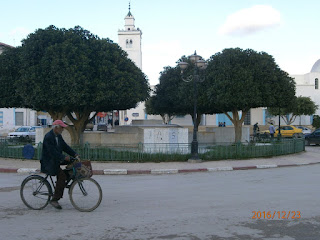Tunisian Cinema challeging social silent codes
Late December is a Tunisian film directed by Moez Kamoun in 2010. The film has got many awards. It had the Special Jury Prize "Best Arab Actress", the Cairo International Film Festival (Egypt 2010), the "Silver Dagger" at the Muscat International Film Festival (Oman 2012) and the "Fifog Silver "at the International Oriental Film Festival of Geneva (Switzerland 2012).
The film trailer
This film
stars Dhafer Abidin, Hend Fahem, Lotfi Abdeli among many others. Late December
focuses on several themes such as the virginity and how it is perceived by the
Tunisian society. Two other subjects were also present in the film: gender and
patriarchy.
Aicha
(Hend Fahem) lives in a remote Tunisian mountainous village and yearns to
fulfill her dreams. After giving her promises for a better life, her boyfriend Helmi
disappears and leaves her in a state of confusion and despair. Sofien (Lotfi
abdeli), a young Tunisian man living in France is portrayed as a saviour for Hend.
Another character Adam (Dhafer Abidin) comes to the village and changes some of
the events which turns the tranquility of the village upside down.
With a generation that struggles with modern
day ideals, religion and identity, Late December portrays a challenging
story that subverts the old conceptions about Western and Arabic culture.
The film is Drama Comedy. it criticizes and tries to break certain misconceptions and obsolete traditions that are strongly anchored in the Tunisian society especially in some rural areas.
The film portrays the binary oppositions between past and present, man and woman, divine and profane.
Old people as the inhabitants of the village represent the past and tradition whereas young people like Hend, Helmi and Adam stand for the present. Some of them are unable to choose which path to follow; staying faithful to their traditional life and past habits or embracing the modern ideals.
" We don't get you people who lives abroad, sometimes you look close-minded and sometimes open." says Aicha to sofien.
Those who are stuck in front of such dilemma have swiftly adopted a defence mechanism to protect their psychological stability and indulge into a social hypocrisy. Sofien is a prototypical character who totally corresponds to such image. He seems to be a modern boy who lives in a contemporary country, yet he still struggling to disconnect with past misconceptions such as a man must always marry a virgin woman " a clean and without past woman."
In one of the scenes, Sofien becomes furious when Aicha tells him she had a previous sexual intercourse and refuses to marry her.
A scene in which Sofien insults and curses Aicha
The movie unveils the social violence against Tunisian woman. She is perceived by the rural society, which is under the authorship of man as, an object. She is perceived as a good that can be either an intact comodity or a rotten and corrupt merchandise.
If such good or "body"is in its original shape, it will be rewarded with the big prize "marriage." Whereas, if the good is corrupt ( if she loses her virginity), the woman will be deprived of the big prize and people's respect and as a consequence she will be considered as a prostitute.
In this scene, six women are presented to the film directors for a dancing scene. They are introduced as merchandise. "look! here you have the merchandise." the movie broker said.
The film criticizes social misconceptions from a feminist point of view and this is obvious through Aicha's behaviours. She is a typical feminist character who has refused to adopt the streotypical image of a countryside girl. She is not veiled, she smokes cigarettes and she dares to speak about her past sexual experience to Sofien.
The film points to the hypocrisy of Tunisian society which is living a double life. Some people seem to be secular and open-minded. Yet, we realise that they still embrace religious stance which is most of the time incongruous with the latter attitude.
The film criticizes social misconceptions from a feminist point of view and this is obvious through Aicha's behaviours. She is a typical feminist character who has refused to adopt the streotypical image of a countryside girl. She is not veiled, she smokes cigarettes and she dares to speak about her past sexual experience to Sofien.
The film points to the hypocrisy of Tunisian society which is living a double life. Some people seem to be secular and open-minded. Yet, we realise that they still embrace religious stance which is most of the time incongruous with the latter attitude.





Comments
Post a Comment